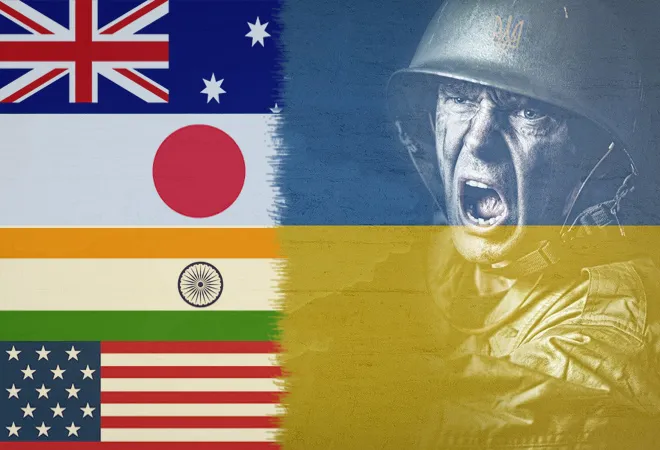-
CENTRES
Progammes & Centres
Location
Will conflicts outside the Indo-Pacific region, such as the Ukraine crisis, threaten the solidarity of the QUAD?

For India, the Ukraine crisis has meant a difficult and delicate balancing act. It was never an easy decision by South Block to abstain on the many resolutions brought in by the United Nations (UN) to censure Russia. A certain section felt that the time had come for India to shed its past inhibitions and stand with the United States (US). But the Russia relationship has stood the test of time for India and in the end, it was more prudent to balance relations. While the Ukraine crisis on its own tests India on the diplomatic and strategic front, the Quad seems to be getting entangled in it.
The Quad—a quadrilateral grouping of India, Australia, Japan, and the US, has become the focus of many initiatives between the four countries as they seek to keep the Indo-Pacific region free and open. The underlying current and what binds the four together is the steady and rapid rise of China. Both the economic and military clout of China makes the global community uncomfortable, and the Chinese President Xi Jinping’s rather naked desire for a Chinese global dominance gives many world leaders much to worry about.
The Quad—a quadrilateral grouping of India, Australia, Japan, and the US, has become the focus of many initiatives between the four countries as they seek to keep the Indo-Pacific region free and open.
Earlier this month, US President Joe Biden convened a sudden meeting of the Quad leaders on Ukraine. The divisions within the Quad are quite simple for one to see. India stands on one side, stubbornly abstaining from UN and other resolutions condemning Russia while the other three members have come out with a harsh critique of Russia and have placed harsh sanctions. According to a report in Reuters, the US Assistant Secretary of State in South Asia, Donald Lu, stated at a Senate subcommittee hearing that, “Washington had been fighting a ‘pitched battle’ with India in diplomatic channels to urge it to take a clear position opposed to Russian actions in Ukraine”. In the same report, he is quoted to have said that the US is looking very closely at whether to apply sanctions on India over its arms deal with Russia.
Russia has been and continues to be India’s main supplier of arms. In December 2021, Russian President Vladmir Putin made a rather quick visit to New Delhi. And the message from the optics was clear—this was Putin’s first visit abroad after a June visit to Geneva to meet US President Biden—and the intention was to tell the world that Russia still has many friends. The signing of a US$ 5.4-billion air missile system deal was another indication about the risks India was willing to take to maintain this relationship. Despite the threat of the US sanctions, India went ahead with its deal with Russia.
These are the very dynamics at play within the Quad which is in a bind as how to present a united response to the Ukraine crisis. For India, more than the other three members, censuring Russia is hard if not out rightly impossible. For the US especially, and increasingly for Australia and Japan, this Indian ambivalence is not easy to accept. India has quietly pushed back with the pitch emanating out of South Block that the mandate of the Quad has to remain the Indo-Pacific region. A report in Nikkei Asia put the tensions within the Quad quite in the open. The report stated that in the virtual Quad meet held earlier this month, “The U.S., Japan, and Australia called on India to join the rest of the group in denouncing Russia over its invasion of Ukraine…Japanese Prime Minister Fumio Kishida spoke with U.S. President Joe Biden, Indian Prime Minister Narendra Modi, and Australian Prime Minister Scott Morrison for about an hour. One of the goals was to get India on board in condemning Russia.”
The US Assistant Secretary of State in South Asia, Donald Lu, stated at a Senate subcommittee hearing that, “Washington had been fighting a ‘pitched battle’ with India in diplomatic channels to urge it to take a clear position opposed to Russian actions in Ukraine”.
The recent visit by Japanese Prime Minister Fumio Kishida to India was watched very closely because of the Ukraine crisis and the fact that both India and Japan are member states of Quad. A joint statement said that Modi and Kishida, in their talks, called for an immediate cessation of violence in Ukraine, pitched for resolution of the conflict through dialogue besides underscoring the importance of safety and security of nuclear facilities in that country. So India stuck to its position of no critique of Russia. Kishida in his comments to the media again emphasised Russia’s actions have ‘shaken’ the roots of the international order. Two leaders and two nations with divergent views was presented. It is also to be noted here that for India, this relationship with Russia has also helped in the evacuations of Indian students who were stuck in Ukraine.
The question then is will the Quad survive the Ukraine test? So far, it seems that the tensions are being kept under wraps, and while internally the US, Japan, and Australia pull in one direction, India is unwilling to join in. Recognising the looming threat of China in the region and the strategic advantages that India offers, the US is unlikely to push beyond a certain point. But future Ukraine-like crisis might not be that easy for the Quad to handle. While the four nations have come together with the focus on one country and one region, any extensions beyond are likely to test the strength of the Quad.
Recognising the looming threat of China in the region and the strategic advantages that India offers, the US is unlikely to push beyond a certain point.
This is where the challenge lies for India as it strives to stay in the Quad but at the same time strives to protect its many bilateral ties. The Quad essentially brings India closer to the US and that is a trajectory that has been on the rise in the last few years. But in a delicate act of balancing, that has not yet translated into India ditching old friends. How long can India continue to sail in two boats will be the diplomatic challenge for it in the near future.
The views expressed above belong to the author(s). ORF research and analyses now available on Telegram! Click here to access our curated content — blogs, longforms and interviews.

Simran Sodhi is a Delhi-based journalist and foreign affairs analyst. She holds a Masters in International Relations from the American University in Washington DC. In ...
Read More +